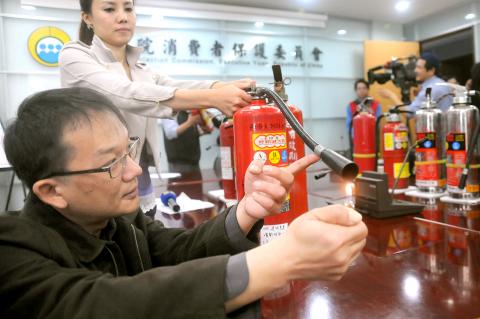Close to one-fifth of extinguishers on public transportation vehicles do not have the proper pressure, while some do not contain enough fire-extinguishing agent, the Consumer Protection Commission (CPC) said yesterday.
Announcing the results of its survey of 100 fire extinguishers on public vehicles, such as regular and high-speed rail trains, as well as long-distance buses, the commission said that three of the fire extinguishers installed on buses could hardly function, while 15 fire extinguishers did not have the proper pressure to release at least 90 percent of the extinguishing agent to meet standards.
Commission section chief Wu Cheng-hsueh (吳政學) said that one fire extinguisher on a Taiwan Railway Administration train had not been replaced for 13 years. Inspectors discovered that the ammonium dihydrogen phosphate content in the extinguishing agent stood at 62 percent, which was 8 less than the minimum threshold, the commission said.

Photo: Lu Chun-wei, Taipei Times
The fire extinguishers that were not up to code had problems such as that the model was not intended for use inside a vehicle, pressure levels not falling within the standard range, being past the expiration date and worn, damaged or detached parts on the device.
However, the commission said there is no legislation covering punishments, so manufacturers and transportation companies could escape fines. Despite efforts of coordination between the commission and fire extinguisher manufacturer associations, companies have been dragging their feet on making improvements, the commission said.
The commission has demanded that commercial motor transportation companies immediately make improvements to ensure the safety of passengers.
In addition, the commission urged the Ministry of Transportation and Communications to establish regulations that would penalize transportation companies if their on-board fire extinguishers were not up to code, since there are currently no such regulations on which appropriate punishments could be based.

TRAFFIC SAFETY RULES: A positive result in a drug test would result in a two-year license suspension for the driver and vehicle, and a fine of up to NT$180,000 The Ministry of Transportation and Communications is to authorize police to conduct roadside saliva tests by the end of the year to deter people from driving while under the influence of narcotics, it said yesterday. The ministry last month unveiled a draft of amended regulations governing traffic safety rules and penalties, which included provisions empowering police to conduct mandatory saliva tests on drivers. While currently rules authorize police to use oral fluid testing kits for signs of drug use, they do not establish penalties for noncompliance or operating procedures for officers to follow, the ministry said. The proposed changes to the regulations require

The Executive Yuan yesterday announced that registration for a one-time universal NT$10,000 cash handout to help people in Taiwan survive US tariffs and inflation would start on Nov. 5, with payouts available as early as Nov. 12. Who is eligible for the handout? Registered Taiwanese nationals are eligible, including those born in Taiwan before April 30 next year with a birth certificate. Non-registered nationals with residence permits, foreign permanent residents and foreign spouses of Taiwanese citizens with residence permits also qualify for the handouts. For people who meet the eligibility requirements, but passed away between yesterday and April 30 next year, surviving family members

China Airlines Ltd (CAL) yesterday morning joined SkyTeam’s Aviation Challenge for the fourth time, operating a demonstration flight for “net zero carbon emissions” from Taiwan Taoyuan International Airport to Bangkok. The flight used sustainable aviation fuel (SAF) at a ratio of up to 40 percent, the highest proportion CAL has achieved to date, the nation’s largest carrier said. Since April, SAF has become available to Taiwanese international carriers at Taipei International Airport (Songshan airport), Kaohsiung International Airport and Taoyuan airport. In previous challenges, CAL operated “net zero carbon emission flights” to Singapore and Japan. At a ceremony at Taoyuan airport, China Airlines chief sustainability

‘ONE CHINA’: A statement that Berlin decides its own China policy did not seem to sit well with Beijing, which offered only one meeting with the German official German Minister for Foreign Affairs Johann Wadephul’s trip to China has been canceled, a spokesperson for his ministry said yesterday, amid rising tensions between the two nations, including over Taiwan. Wadephul had planned to address Chinese curbs on rare earths during his visit, but his comments about Berlin deciding on the “design” of its “one China” policy ahead of the trip appear to have rankled China. Asked about Wadephul’s comments, Chinese Ministry of Foreign Affairs spokesman Guo Jiakun (郭嘉昆) said the “one China principle” has “no room for any self-definition.” In the interview published on Thursday, Wadephul said he would urge China to